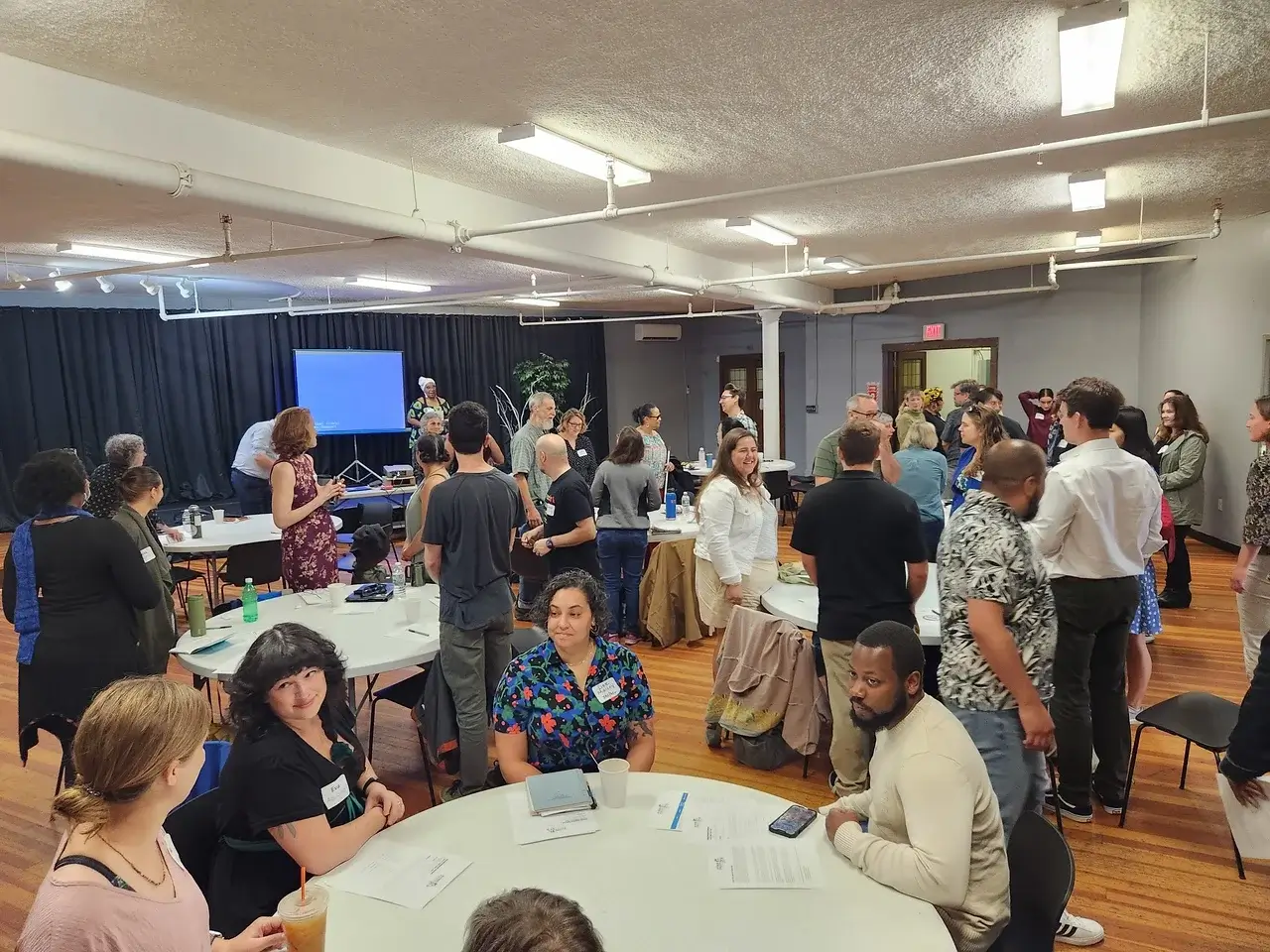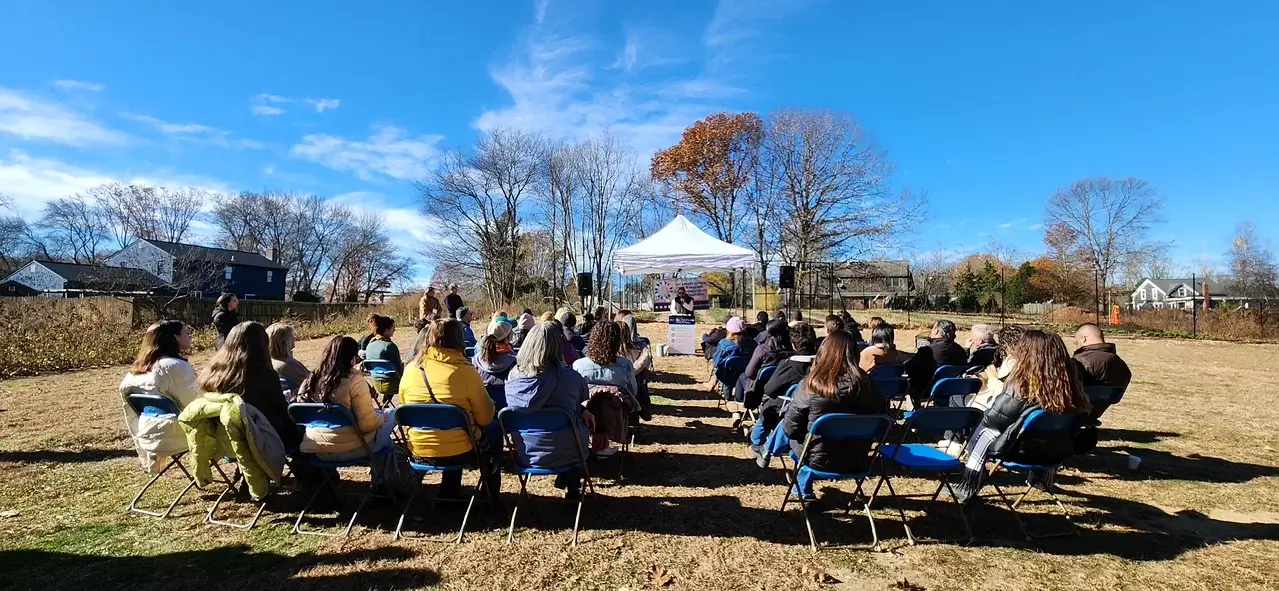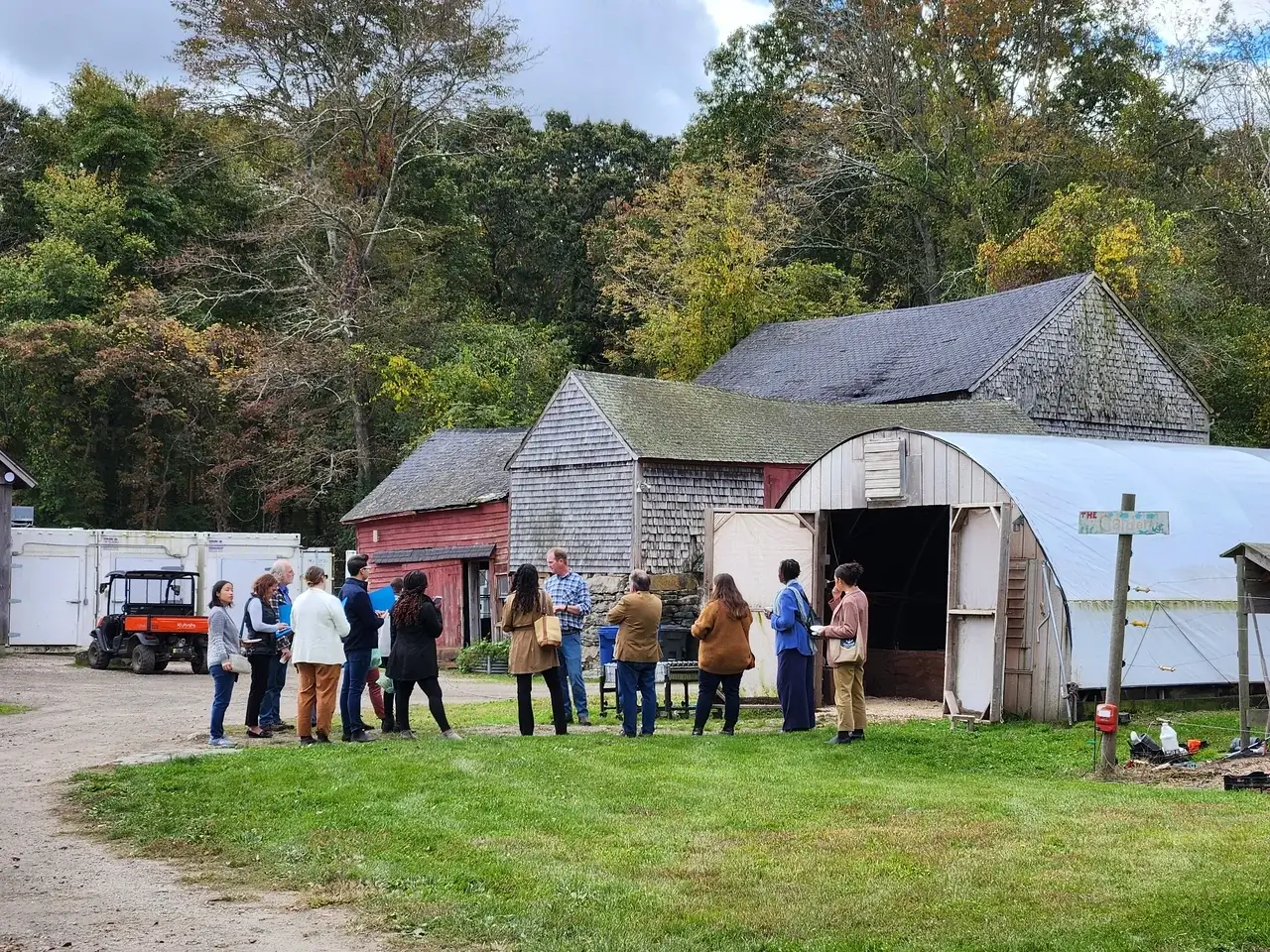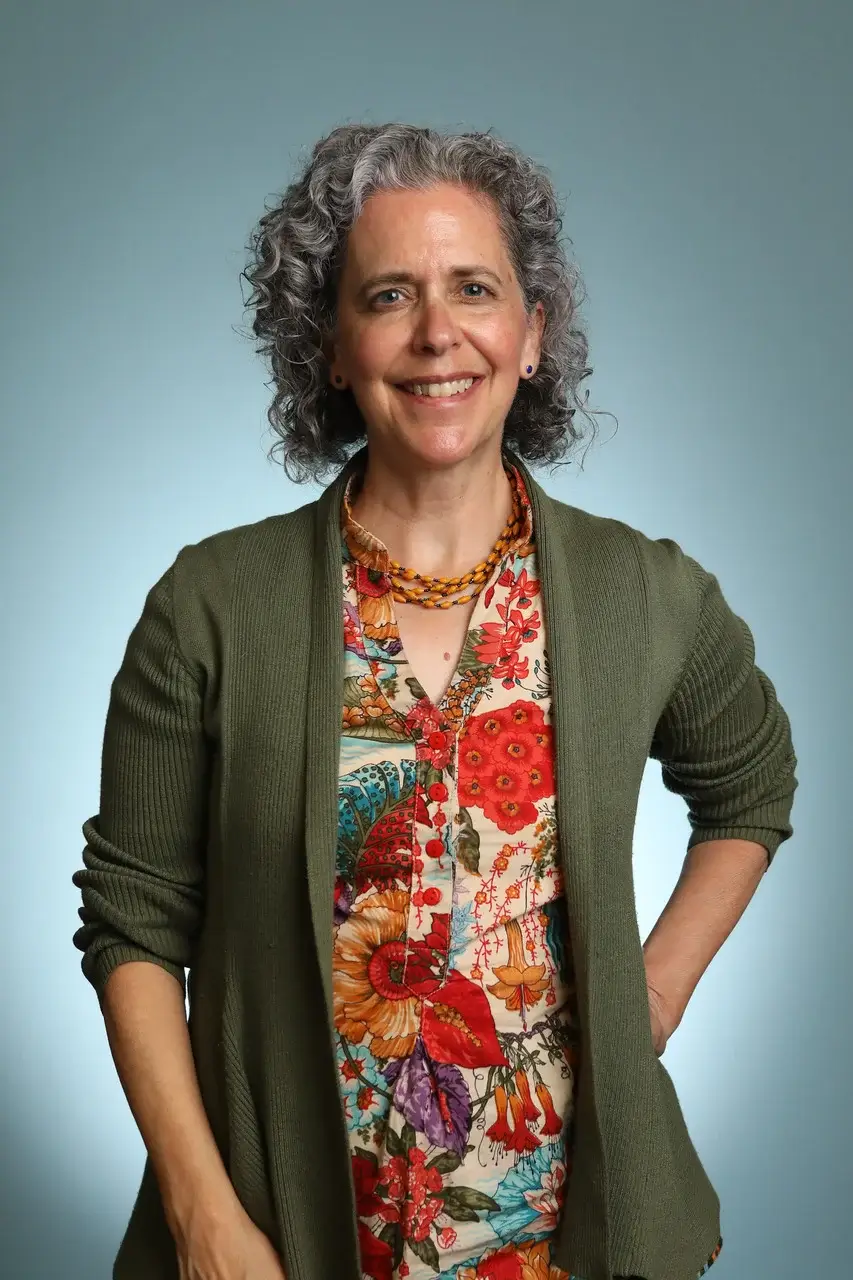Opinion: A More Resilient Food System Starts at the Community Level
High-functioning networks like food policy councils require time and effort–but if we want systemic change, we can’t afford not to invest in them.
Opinion: A More Resilient Food System Starts at the Community Level
High-functioning networks like food policy councils require time and effort–but if we want systemic change, we can’t afford not to invest in them.

Volunteers gleaning with the Farm Fresh Rhode Island Hope's Harvest program. Photo submitted by RIFPC.
It’s time to look beyond the Farm Bill.
The Farm Bill, passed once every five years, is the most important piece of federal legislation affecting American agriculture and food access. Originally designed to keep food prices fair for both supply and demand sides, ensure an adequate supply of food, and protect and sustain natural resources, this bill now plays a wildly outsized role in shaping our food system. Lobbyists and advocates influence it from all angles.

But the Farm Bill is not the be-all and end-all of our food system. It’s easy to think that all changes to our system must start with the Farm Bill, or that the Farm Bill is the only way to have wide influence. It can be easy to overlook opportunities available for progress on the state level, where the smaller-scale forces at work are just as complex, and the stakes just as significant. This year, there will also be scores of state-level bills debated this year from Rhode Island to Texas – bills that will greatly affect farmers, fishers, food entrepreneurs, food access, and food justice all across America.
One of the best ways to impact the food system for the better is to invest in food policy councils (FPCs) at the community, state, and regional level.
TAKE ACTION
Learn how to be a food policy advocate in your community.
Be it public, private, or non-profit work, there are frequently intrasector opportunities for collaboration and information sharing within trade groups, or professional associations, which can benefit everyone, without waiting for omnibus legislation like the Farm Bill. These networks hold regular meetings and events that offer opportunities for relationship-building, coalition development, and generate conversation that can lead to new thinking in the field. Yet few opportunities exist to engage in this important work across sectors, especially on the state level.
In an age where organizations increasingly need to prove their impact, the benefits provided by networks are incredibly valuable.
FPCs bring together diverse stakeholders from different sectors–like food entrepreneurs, farmers, food justice workers, food access workers, and concerned consumers– to identify common ground and collaborate, to help solve problems holistically.

These food system stakeholders share the goal of a more just and resilient food system. Their participation in these networks is based on their belief that investing time and energy in it will help achieve that goal.
FPCs are a kind of ‘backbone network,’’ so named because they provide a central structure critical for efficient operation. While in the technology sector, these networks are recognized as critical to system efficacy and efficiency (and adequately funded in response); in the world of food systems change they are largely ignored (and lack adequate funding). The fact is, FPCs need to be cultivated intentionally and invested in more widely for substantive, measurable food system change to take place.

There are numerous obstacles when building this type of cross-sector network. One of the biggest is that most leaders, no matter what sector they are in, are fully focused on the success of their individual agencies, departments, and organizations. How can they justify prioritizing the time and effort to be part of a network? To be effective, FPCs require members to devote the time to work together in good faith, sometimes with competitors, whether for market share, grant funding, or legislative attention. The emphasis on collaboration often results in compromise that can feel off-brand. On top of that, the cost of not participating can feel fuzzy and far-off to leaders who are laser focused on maintaining their immediate stability while trying to find time to plan strategically for the next year or three.
The fact is, those leaders can’t afford not to work within FPCs.
The fact is, those leaders can’t afford not to work within FPCs. Even the best organizational leaders in the nonprofit sector have a limited ability to focus on systemic change. Without the structure and support network of an FPC, individual progress may be haphazard, and lack the structure and shared purpose that can produce efficient, intentional, and visionary systems change.
Over 20 years ago, Margaret Wheatley, in her book Turning to One Another, saw the potential for significant change in the actions of a few individuals: ““[T]he world only changes when a few individuals step forward. It doesn’t change from leaders or top-level programs or big ambitious plans. It changes when we, everyday people gathering in small groups, notice what we care about and take those first steps to change the situation.”
FPCs create the space for these individuals to band together to create and implement the solutions required for significant food system change to occur.
READ MORE
Can we fix the global food sysstem by 2045?
Enter the ‘food systems leader. Skillful network leaders practicing in the food system space focus on advancing the entire system, with all of its moving, interconnected parts. They honor each individual’s and organization’s challenges and goals, while cultivating their ability to consistently see and value ‘the big picture’ at the same time. They facilitate connection, conversation, and relationship-building. They craft invitations and create spaces where organizational leaders can take a breath, share challenges and opportunities without judgment, listen to new ideas, and gain the vision they need to do their jobs better. This is the demanding work of participatory democracy, focused on the food system.
FPCs create the space for these individuals to band together to create and implement the solutions required for significant food system change to occur.
In an age where organizations increasingly need to prove their impact, the benefits provided by networks are incredibly valuable. Philanthropic decision makers and funders who care about any aspect of the food system – food access and nutrition security, food business and economic development, or the intersections of food, climate, and environment – should invest in backbone food networks and encourage all of their food-focused grantees to join them. This is a path to achieving significant food system change in the next several years, regardless of what happens with the Farm Bill.

Nessa Richman is the executive director of the Rhode Island Food Policy Council and an adjunct professor at the University of Rhode Island College of the Environment and Life Sciences.
Follow us
This work is licensed under a Creative Commons Attribution-NoDerivatives 4.0 International License.
Want to republish a Modern Farmer story?
We are happy for Modern Farmer stories to be shared, and encourage you to republish our articles for your audience. When doing so, we ask that you follow these guidelines:
Please credit us and our writers
For the author byline, please use “Author Name, Modern Farmer.” At the top of our stories, if on the web, please include this text and link: “This story was originally published by Modern Farmer.”
Please make sure to include a link back to either our home page or the article URL.
At the bottom of the story, please include the following text:
“Modern Farmer is a nonprofit initiative dedicated to raising awareness and catalyzing action at the intersection of food, agriculture, and society. Read more at <link>Modern Farmer</link>.”
Use our widget
We’d like to be able to track our stories, so we ask that if you republish our content, you do so using our widget (located on the left hand side of the article). The HTML code has a built-in tracker that tells us the data and domain where the story was published, as well as view counts.
Check the image requirements
It’s your responsibility to confirm you're licensed to republish images in our articles. Some images, such as those from commercial providers, don't allow their images to be republished without permission or payment. Copyright terms are generally listed in the image caption and attribution. You are welcome to omit our images or substitute with your own. Charts and interactive graphics follow the same rules.
Don’t change too much. Or, ask us first.
Articles must be republished in their entirety. It’s okay to change references to time (“today” to “yesterday”) or location (“Iowa City, IA” to “here”). But please keep everything else the same.
If you feel strongly that a more material edit needs to be made, get in touch with us at [email protected]. We’re happy to discuss it with the original author, but we must have prior approval for changes before publication.
Special cases
Extracts. You may run the first few lines or paragraphs of the article and then say: “Read the full article at Modern Farmer” with a link back to the original article.
Quotes. You may quote authors provided you include a link back to the article URL.
Translations. These require writer approval. To inquire about translation of a Modern Farmer article, contact us at [email protected]
Signed consent / copyright release forms. These are not required, provided you are following these guidelines.
Print. Articles can be republished in print under these same rules, with the exception that you do not need to include the links.
Tag us
When sharing the story on social media, please tag us using the following: - Twitter (@ModFarm) - Facebook (@ModernFarmerMedia) - Instagram (@modfarm)
Use our content respectfully
Modern Farmer is a nonprofit and as such we share our content for free and in good faith in order to reach new audiences. Respectfully,
No selling ads against our stories. It’s okay to put our stories on pages with ads.
Don’t republish our material wholesale, or automatically; you need to select stories to be republished individually.
You have no rights to sell, license, syndicate, or otherwise represent yourself as the authorized owner of our material to any third parties. This means that you cannot actively publish or submit our work for syndication to third party platforms or apps like Apple News or Google News. We understand that publishers cannot fully control when certain third parties automatically summarize or crawl content from publishers’ own sites.
Keep in touch
We want to hear from you if you love Modern Farmer content, have a collaboration idea, or anything else to share. As a nonprofit outlet, we work in service of our community and are always open to comments, feedback, and ideas. Contact us at [email protected].by Nessa Richman, Rhode Island Food Policy Council, Modern Farmer
January 24, 2025
Modern Farmer Weekly
Solutions Hub
Innovations, ideas and inspiration. Actionable solutions for a resilient food system.
ExploreExplore other topics
Share With Us
We want to hear from Modern Farmer readers who have thoughtful commentary, actionable solutions, or helpful ideas to share.
SubmitNecessary cookies are absolutely essential for the website to function properly. This category only includes cookies that ensures basic functionalities and security features of the website. These cookies do not store any personal information.
Any cookies that may not be particularly necessary for the website to function and are used specifically to collect user personal data via analytics, ads, other embedded contents are termed as non-necessary cookies.